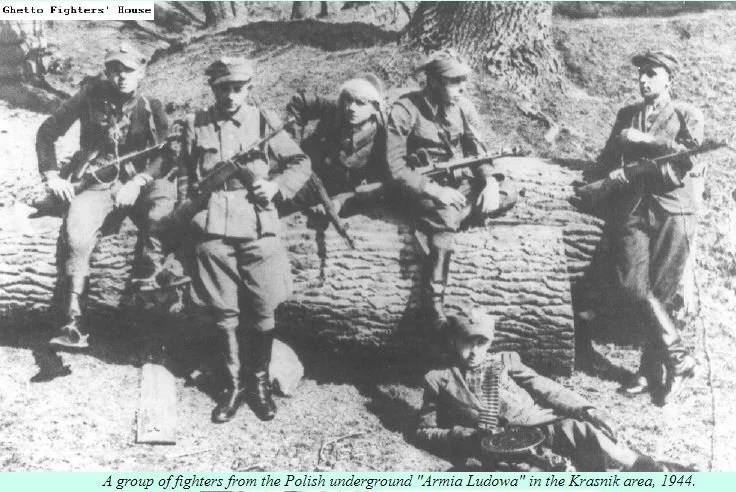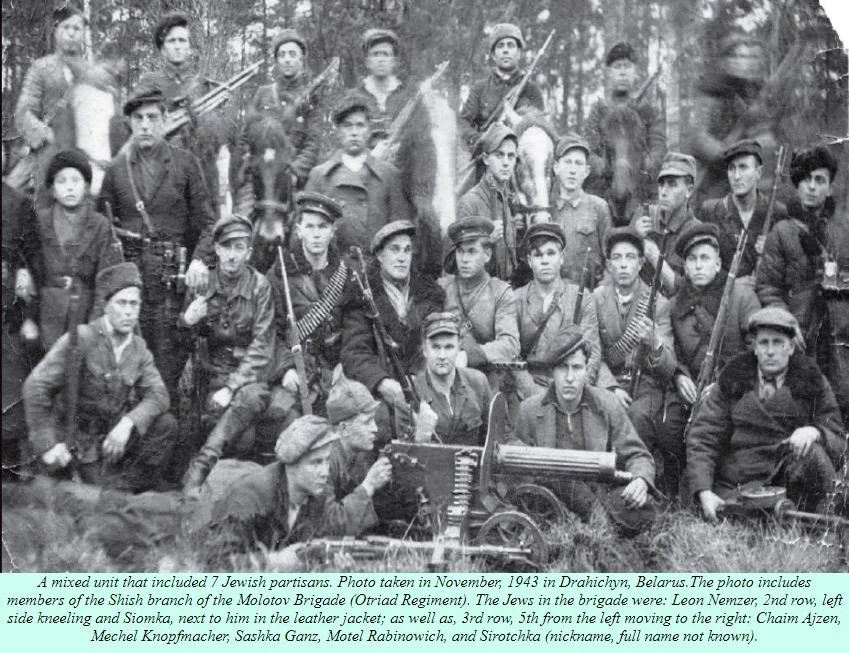Remember the Jewish Partisans of the Lublin District - Groups East of Lublin
Groups East of Lublin: There were more than a dozen Russian partisan groups in the Lublin district. There was significant overlap between the Russian partisan groups in the Lublin district and both the Red Army and the Armia Ludowa. One of the earliest Russian partisan group was led by an escaped Soviet officer called David. In the spring of 1942, David's group joined a partisan unit under the command Fiodor Kovalov (partisan name Teodor Albrecht), a Soviet officer and escaped POW. The group became known as Pushkin's group, or Imienia Jozefa Bema. It consisted of both Jewish and non-Jewish Russian fighters, mostly escaped POWs, and had around 40 unskilled fighters.
Fighting near the Makoszka forests near Parczew and Ostrow Lubelski, the first battle of Fioder's partisans took place in November 1942. The partisans tried to beat off a German assault on a forest where a group of Parczew Jews were hiding. The partisans were forced to retreat, and most of the Jews were killed on the spot. On December 6-8, 1942, the partisans fought another battle in the Parczew forests. In spite of having considerable police and military forces, the Germans suffered significant losses while the partisans managed to successfully extract themselves out of the encirclement. On December 17, 1942 the Fiodor unit captured the town of Ostrow Lubelski, killing a policeman and wounding a few others. During this battle, a Polish police post was attacked while a post office, a dairy factory assisting the German war effort, and a German government office were destroyed.
The following Jewish members were killed in action around Passover, 1943: Chuna Kot, Lejb Grinblat, Hersz Rodzinek, Yosef Waserman and Itzak Tarif. Soon after, Fiodor's Pushkin partisans joined Jan Holod's battalion, which was working with Chil Grynszpan's group from spring 1943 forward. In the second half of 1943 and the beginning of 1944, Ostrow Lubelski was under the control of the Communist AL (Armia Ludowa). Eventually Fiodor is believed to have gone eastward into Russian territory.
A Soviet group led by the Edelstein brothers and Itzhak Reichman numbered around 20 fighters. The
Edelstein brothers were refugees from Kalisz who went to Povorsk, Ukraine and organized an
underground resistance there. The group operated out of the forests. Misha Edelstein was humble
and modest but wanted revenge for the deaths of his parents and girlfriend Raja Plus. Today in
Rivne there is a memorial in memory of Misha Edelstein. He was murdered in battle after the
liberation. Pasha Reichman later joined another unit and went to Israel after the war.
A second Soviet partisan group, called the Janowski group, is discussed in the section below.
The Wanda Wasilewska brigade led by Oleksiy Fedorov (Alexei Fyodorov) was a large brigade of mixed Jewish and non-Jewish fighters. This group mostly fought east of the Bug River, but eventually crossed westward to take on the Germans more directly. According to partisan survivor Ben Kamm, the brigade destroyed 549 German trains by the end of 1943.
Many of the groups, including the Fyodorov group, received airdrops from Russia, which included such needs as ammunition, mines, and medicines. They also received regular reports from Radio Moscow. The group's objectives were to distribute weapons to the local population and to get as many people to fight as possible.
A fourth Soviet group was led by Maksim Misyura, a non-Jew, and had 90 Jewish fighters in it. It was called the Voroshilov battalion. Aleksander Abugov, Froim Bakalczyk, Moshe Bromberg, and Nahum Silberpark were among the Jewish leaders of the group. The group included Jews from Dabrowica (Dubrovitsa), Sarny, and Wlodimierzec in the Wolyn district. In January and February of 1943, the group carried out raids on police stations, ranches, and German administration buildings. The partisans seized foodstuffs and animals (horses and cows) which they distributed to the neighboring residents.
Jews who fought with the Armia Ludowa: Several partisan units also joined with the Armia Ludowa, the left-wing Polish forces fighting the Nazis. Most of the Jews involved in the AL were not political at all, but simply were fighting to sustain their livelihood.
The Janowski group was one such group who fought with the Armia Ludowa. This mixed group, which had around 50 to 70 fighters in 1944, was led by Jews Leon Kasman and Leon Bielski. The Janovski group arrived to Parczew forests at the beginning of 1943, crossing west from the Bug. Their main mission was to free the Poniatowa Labor Camp near Opole Lubelski. However before that took place, in November of 1943, all of the Jews in Poniatowa were murdered. The group continued moving west and came to Mielec, Poland near the end of the war. They succeeded in attacking German units and blowing up trains. They received heavy support from Russia, as the heads of the unit had strong ties to the Russian military. They also took revenge on a Polish family that had shot the Jews they were hiding, however the location of this incident is not known.
Jewish doctor Michael Temchin was a commander in the Armia Ludowa, a leftist underground organization in Poland. His unit, which consisted of both Jews and non-Jews, was active around Krasnik, Lublin district. They planned to rescue Jews from the Krasnik Ghetto. However those inside the Ghetto were hesitant to allow the partisans to act, and in one night the entire Krasnik Ghetto was wiped out with few managing to survive or escape.
A significant number of Jews reached important positions in the Polish partisan movement, especially in
Units on the left, the AL, and the Socialist Fighting Organization. The Commander of the largest Partisan
Battalion in Generalgouvernement territory was the Jewish Officer, Alexander Skotnicki (Captain Zemsta),
who was included among the Armia Ludowa's renowned organizers list.
General Rola-Zimierski, the commander of the Armia Ludowa, declared at a meeting of the Polish National Assembly on the 2nd of January 1946: "Jewish soldiers fought against the occupation forces with much devotion and courage. They were valiant fighters and very often great heroes" and in his letter to the Organization of Jewish Partisans (F.P.O.), the general wrote: "Among the Jews who remained alive there were thousands who went into the woods to fight with arms, and fought together with their Polish partisan comrades against the common enemy."






Jewish Partisans in the Lublin District - Additional Sources
Books:
- Azoy iz es geven (The Way It Was, Yiddish), Buenos Aires, 1948 by Jonas Turkow.
- Chaim Ajzen Remembers by Henry Steel
- I Chose Life by Samuel Gruber
- Codename Barber: The Story of Partisan Mischa Stahlhammer by Semmy Stahlhammer
- Die Numen Is -- Folk by Shmuel Persov
- Escape from Sobibor by Richard Raschke
- Fighting Back: A Memoir of Jewish Resistance in WWII by Harold Werner
- From the Ashes of Sobibor: A Story of Survival by Thomas Toivi Blatt
- Fugitives of the Forest: Heroic Stories of Resistance & Survival in WWII by Gerald Levine
- Holocaust Journey: Traveling in Search of the Past by Martin Gilbert
- Hurbn un gvure fun shtetl Markuszow (Destruction and Heroism, Town of Markuszow). Yiddish. Tel Aviv, 1955.
- Jewish Resistance in Nazi-Occupied Eastern Europe by Reuben Ainsztein
- Imferno em Sobibor/Portuguese (Hell in Sobibor) by Stanislaw Szmajzner
- Labor Camps and Communities in the Lublin District
- The Ludmilowka Pogrom
- Martyrdom and Revolt. Documents and Testimonies by Miriam Novitch, New York, 1980. Includes several testimonies from Sobibor uprising survivors who fought as partisans.
- Pogaduszki: The memoirs of Stanislaw Sierpinski. Haifa, 2005. In Polish.
- The Precarious Liberation of the Janiszow Forced Labor Camp
- Promise at Sobibor: A Jewish Boy's Story of Revolt by Fiszel Bialowitz
- Rather Die Fighting: A Memoir of WWII by Frank Blaichman
- Reluctant Soldier: A Jewish Partisan's Story by Jakob Friedman
- The Reminiscences of Dov Berezinby Mikolai Berezin
- Sobibor: Martyrdom and Revolt by Miriam Novitch. Holocaust Library, 1980.
- To Sobibor and Back: An Eyewitness Account by Kalman Wewryk
- Spotkanie z ziemia by Leon Bielski. Ksiazka i Wiedza. Warsaw, 1965.
- Story of a Secret State: My Report to the World by Jan Karski
- Szmul Zygielbojm: Profile of Partisan Hero by Ronald Cohn and Jesse Russel
- They Were Many by Binyamin West
- They Fought Back by Yuri Suhl
- Through Forests and Pathways by Sanel Rozenson
- The Undefeated by Shiye Goldberg
- The Wars of the Jewish Partisans in Eastern Europe by Moshe Kaganovitch
- War of the Doomed: Jewish Armed Resistance in Poland, 1942-1944 by Shmuel Krakowski
- The Witch Doctor: Memoirs of a Partisan by Dr. Michael Temchin
Articles:
- About Jewish Partisan Frank Blaichman
- Armies of the Young: Child Soldiers in War and Terrorism; pps. 48-51 discuss partisan children in the Lublin Forests
- Fate of Some of the Sobibor Survivors (see also: Sobibor Remembrance Project)
- From a Prisoner's Camp to a Partisan Troop by Alufi and Barkeli in "Aishishuk", pages 77-78. Profile of partisan Mordechai Glebocki, aka Shneor Glembotzky.
- Iberlebungen fun a Veloner Krigsgefangenen in Sefer Zikaron le-Kehillat Wielun. Tel Aviv, 1971, pp. 380-384. Testimony of Aryeh Lejb Helfgot.
- Jewish Revolts and Uprisings in the Lublin District
- Long Valley Man's Memoir Tells Heroic Life of Partisan
- "The Polish Underground and the Jews: A Reassessment of Home Army Commander Tadeusz Bor-Komorowski's Order 116 Against Banditry" by John Lowell Armstrong. Cites the testimony of Krasnik partisan Hersz Broner. The Slavonic and East European Review 72, no. 2 (April 1994): 273.
- Rescue of Jews from the Wlodawa Ghetto
- Rise and Fall of Wlodawa - from the Yizkor Book
- Russian Jews and the Sobibor Escape
- Sobibor Survivors' Testimonies (see also: Sobibor Remembrance Project)
- Understanding the Polish Obsession with Salomon Morel
Films:
- Belzec Survivor Braha Rauffmann
- Escape from Sobibor
- Poland, Personally: Featuring Michael Kaftori, Wlodawa Partisan
- Profile of survivors Blaichman and Gruber
- Shmuel Mietek Gruber Video Testimony
- Tribute Video to Cesia and Frank Blaichman & Rose and Joe Holm
Additional Links:
- Definitions of Important Terms Related to Jewish Partisans
- Lasting Memory Foundation: Lublin District Commemorations
- Betar Partisans in Hrubieszow
- Hersh Zimmerman's Holocaust Resistance
- Chaim Ajzen's Holocaust Resistance
- In Defense of Salomon Morel
- Polish Resistance Movements and the Jews


